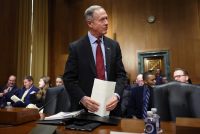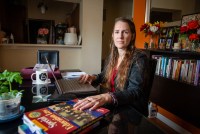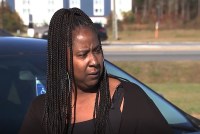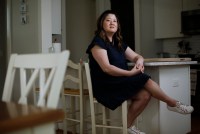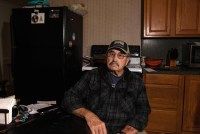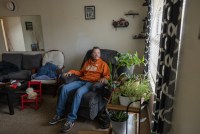Las verificaciones de antecedentes para comprar armas aumentaron 60% de 2019 a 2020, año en que el gobierno federal declaró la emergencia sanitaria por covid.
Ese mismo año, más de 45.000 personas murieron por violencia con armas de fuego.
Guns Marketed for Personal Safety Fuel Public Health Crisis in Black Communities
During the covid pandemic, gun marketers told many Americans they needed firearms to defend against criminals and protesters. Then firearm deaths mounted rapidly in racially segregated and low-income neighborhoods, according to federal data.
Disability Bias Complaints Peak as the Office That Investigates Them Is Gutted
Get our weekly newsletter, The Week in Brief, featuring a roundup of our original coverage, Fridays at 2 p.m. ET.
Parents Fear Losing Disability Protections as Trump Slashes Civil Rights Office
The Education Department’s civil rights office often intervenes when students face discrimination based on race, sex, religion, or disability and their families can’t resolve complaints locally. Parents fear the effort to gut the federal agency will leave them with nowhere to seek justice.
Guns, Race, and Profit: The Pain of America’s Other Epidemic
Firearm violence is killing Americans at the scale of a public health epidemic. The suffering is concentrated in Black neighborhoods damaged by segregation, disinvestment, hate crimes, and other forms of racial discrimination.
Watch: Why the US Has Made Little Progress Improving Black Americans’ Health
KFF Health News senior correspondents Fred Clasen-Kelly and Renuka Rayasam discuss how government decisions undermine Black health.
Black Americans Still Suffer Worse Health. Here’s Why There’s So Little Progress.
The United States has made almost no progress in closing racial health disparities despite promises, research shows. The government, some critics argue, is often the underlying culprit.
A Boy’s Bicycling Death Haunts a Black Neighborhood. 35 Years Later, There’s Still No Sidewalk.
John Parker was in first grade when he was struck by a pickup truck driving on Durham’s Cheek Road, which lacks sidewalks to this day. Neighborhoods with no sidewalks, damaged walkways, and roads with high speed limits are concentrated in Black neighborhoods, research finds.
A Teen’s Murder, Mold in the Walls: Unfulfilled Promises Haunt Public Housing
For years, federal lawmakers have failed to deliver the money needed to fix derelict public housing, leaving tenants — mostly people of color and families with low incomes — living with mold and gun violence that has had lasting health consequences.
US Surgeon General Declares Gun Violence ‘a Public Health Crisis’
Gun violence is the No. 1 cause of death for children and teens in America. Vivek Murthy says the toll extends beyond deaths, as survivors deal with “a lifetime of physical and mental health impacts” and those who witness shootings become traumatized.
Exclusive: Social Security Chief Vows to Fix ‘Cruel-Hearted’ Overpayment Clawbacks
New Social Security Commissioner Martin O’Malley is promising to change how the agency reclaims billions of dollars it wrongly pays to beneficiaries, saying the existing process is “cruel-hearted and mindless.”
Advocates Say a Practice Harms Disabled Children, Yet Congressional Action Is Stalled
In the photos, a 9-year-old boy with autism appears barricaded between cubbies and furniture stacked near the walls of a North Carolina classroom. His mother, Erin McGrail, said her son was physically restrained at least 14 times while in third grade at Morrisville Elementary School. She said she learned details of his seclusion only after […]
Escuelas ignoran normas federales sobre restricción y aislamiento de estudiantes
La ley federal exige que los distritos escolares informen al Departamento de Educación de Estados Unidos cada vez que aíslan o restringen físicamente a un estudiante.
‘I’m Not Safe Here’: Schools Ignore Federal Rules on Restraint and Seclusion
Federal officials have long warned that restraint and seclusion in schools can be dangerous and traumatizing for children, but school districts often fail to report incidents as required by law.
‘I Am Just Waiting to Die’: Social Security Clawbacks Drive Some Into Homelessness
The Social Security Administration is reclaiming billions of dollars in alleged overpayments from some of the nation’s poorest and most vulnerable, leaving some people homeless or struggling to stay in housing, beneficiaries and advocates say.
The Painful Pandemic Lessons Mandy Cohen Carries to the CDC
Mandy Cohen, the new director of the Centers for Disease Control and Prevention, earned praise for her leadership and communication as the face of North Carolina’s response to covid-19. People in the state’s most vulnerable communities tell a more complicated story.
A Mom Owed Nearly $102,000 for Hospital Care. Her State Attorney General Said to Pay Up.
As politicians bash privately run hospitals for their aggressive debt collection tactics, consumer advocates say one North Carolina family’s six-figure medical bill is an example of how state attorneys general and state-operated hospitals also can harm patients financially.
‘A System in Crisis’: Dysfunctional Federal Disability Programs Force the Poor to Pass Up Money
With little or no income, disability applicants are seeking Social Security early retirement benefits even though it could cost them tens of thousands of dollars in future income, lawyers say.
As US Life Expectancy Falls, Experts Cite the Health Impacts of Incarceration
In a nation with one of the highest incarceration rates in the world, imprisonment speeds the aging process, research shows. Some experts complain the federal government isn’t collecting or releasing data that could identify disease patterns and prevent deaths.
A Law Was Meant to Free Sick or Aging Inmates. Instead, Some Are Left to Die in Prison.
The First Step Act was supposed to help free terminally ill and aging federal inmates who pose little or no threat to public safety. But while petitions for compassionate release skyrocketed during the pandemic, judges denied most requests.













